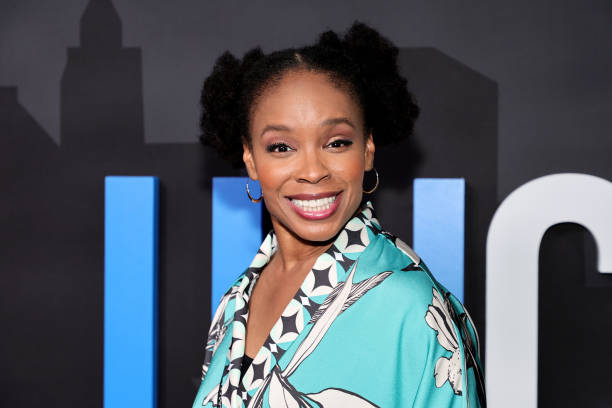
Imagine waking up in a pool of blood and not knowing what was going on with your body. That was the case for talk show host Amber Ruffin.
“I found out I had fibroids after I woke up in a pool of blood in spite of wearing a tampon and a pad,” Ruffin tells ESSENCE of the heavy bleeding she dealt with. “That prompted me to go to the gynecologist and she let me know that I had two softball-sized fibroids.”
Prior to this, Ruffin had been ignoring the symptoms that something was wrong.
“I ignored all of the symptoms because of a history of horrible doctors,” she says. “I was also more interested in working than taking the time I needed to make sure my friggin’ uterus didn’t fall out. That’s crazy behavior that will surely put you in danger. But I did exactly that.”
Now the 43-year-old, normally known for cracking jokes on "The Amber Ruffin Show", is getting serious about spreading awareness on something that affects so many women, especially Black women, who are 2 to 3 times more likely to develop fibroids. Nearly 80 percent of Black women in this country develop fibroids by age 50.
“You know what’s crazy? The amount of people I knew who had fibroids! There’s like a billion of us and no one said a frigging word!” she says. “The only way I found out is I told everyone with ears and I’m not exaggerating when I say a third of the people I talked to had had it. Many had surgery to get them removed. But I knew almost nothing about fibroids when I got them, which is odd because it’s so common.”
Why she choose a hysterectomy
With approximately 600,000 hysterectomies performed annually in the U.S., hysterectomies are one of the most common surgeries performed, especially among Black women who are twice as likely to have their uterus removed as white women.
Many women are recommended for this life-changing procedure, which involves the complete removal of the uterus, without the option of non-invasive alternatives.
While many women may not want to undergo the invasive procedure, for Ruffin, it was a no-brainer.
“I have always wanted a hysterectomy,” she admits. “I’ve known since time began that I did not want children. So every period, I spent four days trying to figure out a way to make it my last period. In fact, I asked my gynecologist if I could have a hysterectomy and she said, ‘No! You can’t just have one for no reason!’ So when she told me about my fibroids, I was like ‘Can I have one now?’ and she said yes! It was probably the only time she got to tell someone that as good news.”
“I was thrilled,” she adds. “To this day, every time I see a tampon, I laugh. I feel so frigging lucky.”
Her message to other women
Still, the statistics for women recommended for a hysterectomy without knowing their options are startling. Unlike it was for Ruffin, a hysterectomy isn't a happy ending for most women. Recognizing this has led Ruffin on a mission to make sure women know what's going on with their bodies so that they are able to make the best choices for their overall health and comfort.
“Black women are more likely to experience fibroids. So, let’s talk about it,” she says. “Our silence surrounding gynecological issues is a result of the patriarchy. And as it dies, so do all the things that prop it up. So now is a great time to talk about women’s health.”
This involves getting familiar with the symptoms of fibroids, which include:
- Heavy menstrual bleeding
- Menstrual periods lasting more than a week
- Pelvic pressure or pain
- Frequent urination
- Difficulty emptying the bladder
- Constipation
- Backache or leg pains
While we've been programmed to think that heavy periods and uncontrollable bleeding that disrupt our daily lives is normal, it's not and you don't have to suffer in silence.
Ruffin advises writing down every symptom you've experienced and taking it with you to your gynecologist. He or she can help you get to the root of what's causing you problems, and ultimately help you find the right treatment depending on the size and location of your fibroids as well as your age. And if your doctor is being dismissive, it is within your right to find a new one.
“When you ask [your doctor] what’s causing your pain, and they say ‘I don’t know,’ you ask, ‘How do we find out what’s going on?’” she shares. “I can’t come here with pain and leave here with no answers.” And if you don’t get answers, Ruffin says that’s a clear sign that you should see someone else. “A good doctor will want to know the answers.”
She advises taking advantage of websites like Zocdoc to read reviews of doctors before you commit. “And don’t just look at the first review. Scroll down to the last review. That’s the bad one,” she adds.
Fibroids affect everyone differently, but the good news is that there is no shortage of options to provide you the relief you desire whether you opt to have your fibroids removed or have your uterus removed entirely like Ruffin.









